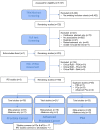Systematic review and meta-analysis of the associations between body mass index, prostate cancer, advanced prostate cancer, and prostate-specific antigen
- PMID: 32162172
- PMCID: PMC7105428
- DOI: 10.1007/s10552-020-01291-3
Systematic review and meta-analysis of the associations between body mass index, prostate cancer, advanced prostate cancer, and prostate-specific antigen
Abstract
Purpose: The relationship between body mass index (BMI) and prostate cancer remains unclear. However, there is an inverse association between BMI and prostate-specific antigen (PSA), used for prostate cancer screening. We conducted this review to estimate the associations between BMI and (1) prostate cancer, (2) advanced prostate cancer, and (3) PSA.
Methods: We searched PubMed and Embase for studies until 02 October 2017 and obtained individual participant data from four studies. In total, 78 studies were identified for the association between BMI and prostate cancer, 21 for BMI and advanced prostate cancer, and 35 for BMI and PSA. We performed random-effects meta-analysis of linear associations of log-PSA and prostate cancer with BMI and, to examine potential non-linearity, of associations between categories of BMI and each outcome.
Results: In the meta-analyses with continuous BMI, a 5 kg/m2 increase in BMI was associated with a percentage change in PSA of - 5.88% (95% CI - 6.87 to - 4.87). Using BMI categories, compared to normal weight men the PSA levels of overweight men were 3.43% lower (95% CI - 5.57 to - 1.23), and obese men were 12.9% lower (95% CI - 15.2 to - 10.7). Prostate cancer and advanced prostate cancer analyses showed little or no evidence associations.
Conclusion: There is little or no evidence of an association between BMI and risk of prostate cancer or advanced prostate cancer, and strong evidence of an inverse and non-linear association between BMI and PSA. The association between BMI and prostate cancer is likely biased if missed diagnoses are not considered.
Keywords: Body mass index; Meta-analysis; Prostate cancer; Prostate-specific antigen; Screening; Systematic review.
Conflict of interest statement
The authors declare no conflict of interest.
Figures






References
-
- World Health Organisation International Agency for Research on Cancer. GLOBOCAN 012: Estimated Cancer Incidence, Mortality and Prevalence Worldwide in 2012 [Internet]. 2015 [cited 18 Dec 2015]. https://globocan.iarc.fr/Pages/fact_sheets_cancer.aspx
-
- Cancer Research UK. Prostate Cancer Statistics [Internet]. 2019 [cited 31 Jan 2019]. https://www.cancerresearchuk.org/health-professional/cancer-statistics/s...
-
- Markozannes G, Tzoulaki I, Karli D, Evangelou E, Ntzani E, Gunter MJ, et al. Diet, body size, physical activity and risk of prostate cancer: an umbrella review of the evidence. Eur J Cancer. 2016;69:61–69. - PubMed
Publication types
MeSH terms
Substances
Grants and funding
LinkOut - more resources
Full Text Sources
Medical
Research Materials
Miscellaneous

